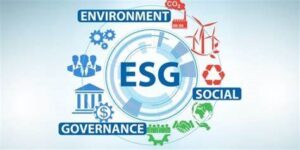
The U.S. Securities and Exchange Commission (SEC) has positioned itself as one of the United States’ leading government regulators on environmental, social, and governance (ESG) issues and in 2023 has continued a pattern of active enforcement actions focusing on their perceived view of ESG misconduct.
The underpinning of these actions has its roots in various places, including those that occurred on March 4, 2021, when the SEC announced the creation of a “Climate and ESG Task Force” in its Division of Enforcement, to focus on ESG-related gaps and misstatements in disclosures by publicly-traded companies, mutual funds, and other investment vehicles.
One of the SEC’s main enforcement focuses is “greenwashing,” a term that describes when a publicly-traded company, mutual fund, or other public investment vehicle makes a misleading claim about its ESG policies or credentials. For instance, some mutual funds may market themselves as an “environmentally-friendly” energy fund but have a relatively small amount of investor funds invested in renewable energy sources. Critics of the current regulation regime have asserted that many investment vehicles mislead investors with terms like “green,” “carbon-neutral,” and “environmentally-friendly.” These broad terms, critics say, are not adequately defined and may convince investors to direct their money to funds that the investors believe align with ESG values when the funds themselves are not actually evaluating whether their investments are in line with such values.
In late March 2022, the SEC’s Division of Examinations used the term “greenwashing” in its 2022 Examination Priorities to describe certain activities that the SEC would be paying particular attention to in the coming months The SEC noted that it would focus on whether public investment vehicles are “overstating or misrepresenting the ESG factors considered or incorporated into portfolio selection (e.g., greenwashing), such as in their performance advertising and marketing.”
The SEC proposed new greenwashing-focused rules in 2022 that would strengthen the Division of Enforcement’s ability to fight against misleading ESG disclosures. In August 2022, after a public comment period, the SEC’s commissioners voted 3-to-1 to move forward with proposed climate disclosure ESG-focused rules. These rules focus on both publicly-traded companies and investment advisors and funds. Under these climate disclosure rules (expected to be made final in April, 2023), publicly-traded companies are required to include certain climate-related disclosures in their public filings. Further, these rules will require investment advisors and funds who associate their investments with ESG to provide specific disclosures about how they pursue ESG strategies in their investments.
While these rules are still pending and have not yet been finalized, the Division of Enforcement has continued its focus on greenwashing enforcement efforts without even having the benefit of these proposed rules.
The SEC has publicly announced various settlements in the banking space and in the manufacturing space involving tens of millions of dollars in agreed-upon penalties in multiple enforcement actions focused on greenwashing. These actions have focused on SEC investigations of internal policies governing mutual funds and investment strategies branded as ESG investments.
The ESG task force has also investigated and charged companies whom the SEC found were not adequately disclosing environmental-related risks. The SEC has, for instance, settled a charge with a mining company related to failure to disclose the financial risks of mercury contamination of a river located near a Brazilian mine.
Through these actions, the SEC has indicated that it will target companies whose policies do not adequately ensure that these investment products align with stated goals of investing in ESG-focused products. Further, the SEC is keeping a close eye on required disclosures by public companies as these disclosures relate to ESG risks and issues that companies may be required to communicate to investors. The SEC undertook these enforcement efforts under existing securities laws and regulations without final passage of the proposed ESG-focused climate disclosure rules mentioned above.
Clearly, the SEC is not waiting for final climate disclosure rules to hone in on greenwashing practices, and the proposed climate disclosure rules will only strengthen the SEC’s ability to engage in similar investigations and enforcement actions.
The Division of Examination’s 2023 Examination Priorities do not explicitly use the term “greenwashing,” but they indicate that the SEC will continue to focus on enforcement actions against companies that engage in this practice. The 2023 Priorities state that the SEC will examine “whether ESG products are appropriately labeled and whether recommendations of such products for retail investors are made in investors’ best interests.” This language indicates that greenwashing-focused enforcement is clearly still a priority for the SEC, especially when paired with the SEC’s proposed new rules requiring ESG climate disclosures.
The SEC’s focus on greenwashing means that organizations associating themselves or their investments with ESG objectives should assess whether their actions line up with their stated ESG efforts and whether their disclosure matches what their records show and whether they are measurable, verifiable and provable statistics and data. Regular auditing of ESG programs, company disclosure, ESG reporting and comprehensive ESG strategy planning could help avoid a costly SEC enforcement action.
Note, we have also published on the Federal Drug Administrations renewed focus on “Greenwashing” in an early post on our blog where we documented the renewed FDA focus in the area of cosmetics and other products and issued additional guidance on greenwashing in the context of utilization of words such as “natural”, “free (of)”, “eco-friendly”, “Cruelty Free”, “renewable” and “sustainable”.
Duane Morris has an active ESG and Sustainability Team to help organizations and individuals plan, respond to, and execute on your Sustainability and ESG planning and initiatives. For more information or if you have any questions about this post, please contact Alek Smolij (the author), Brad A. Molotsky, David Amerikaner, Sheila Rafferty-Wiggins, Alice Shanahan, Jeff Hamera, Nanette Heide, Joel Ephross, Jolie-Anne Ansley, Robert Montejo, Seth Cooley, or the attorney in the firm with whom you are regularly in contact.
